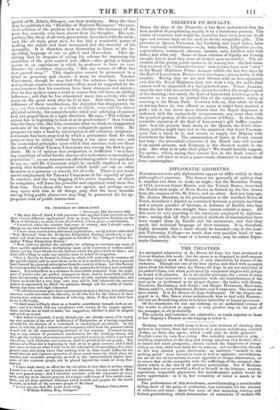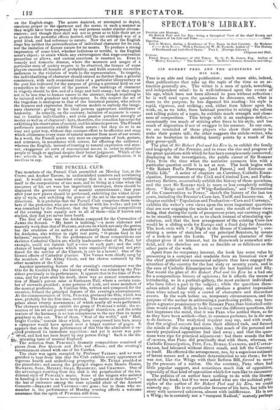Madame ALBERT would seem to have been desirous of showing
that pathos is her forte, from her selection of a serious melodrama, entitled Arthur, ou Seize Ans apres ; which could only be made palatable English tastes by very fine acting. She certainly succeeded in gin, - touching expression to the deep and strong emotions of a mother, xe-J, to insure her son's prosperity, denies herself the happiness of recog- nizing an only child torn from her in infancy, and accidentally thrown AP. in her way sixteen years afterwards : an audience "unused to the melting mood" were moved to tears as well as applause: nevertheless, the art of the clever actress was too apparent to escape observation, or to create that entire sympathy with the sufferings of the assumed cha- racter which is the test of all genuine personation. Yet if Madame ALBERT had not so powerful a rival as herself in the brusque, wanton, capricious, coquettish paysannes, her melodramatic pathos would be more appreciated : as it is, her versatility of talent is much to be admired.
The performance of this melodrama, notwithstanding a considerable falling short of the point of perfection, was noticeable for the absence of violence and noise : there was none of that stamping, roaring, and furious gesticulating, which denaturalize all imitations of modern life on the English stage. The actors depicted, or attempted to depict, emotions proper to the ckaracter and the scene, in such a manner as they might have been expressed by real persons under similar circum- stances; and though their skill was not so great as to hide their art or to produce the powerful effects desired, still the art exhibited was of a good kind, and had reference to nature. Now the art of the English stage has neither the personification of individual character for its end, nor the imitation of human nature for its means. To produce a strong impression of some kind, whether ludicrous or terrific, is the English actor's object ; to attain which, any extravagance that stage-convention prescribes or allows, and custom sanctions, is resorted to. Even in comedy and domestic dramas, where the manners and usages of a particular state of society require to be observed, the licence of some players exceeds all bounds of probability, and habit scarcely reconciles audiences to the violation of truth in the representation. In tragedy, the individualizing of character should extend no farther than a general consistency, with such occasional traits of a particular idiosyncracy as the poet has indicated for the purpose of giving a personal hold on our sympathies to the subject of the passion : the markings of character in tragedy should be few, and of a large and bold stamp ; but they ought not to be less true to human nature in the abstract, though requiring to be imitated with grandeur and refinement. In this respect the art of the tragedian is analogous to that of the historical painter, who selects the features and expression from various models to embody the imagi- nary character ; giving to his ideal persons appropriate attributes of humanity. In comedy, on the contrary, imitation of manners is essen- tial to localize individuality ; and even passion partakes strongly of modes as well as of character : here, therefore, the comedian has scope for exhibiting his observation of society, and his mimetic powers. The French performers necessarily exhibit French nature ; but they do so in an easy and quiet way, without that constant effort to be effective and stagy which obliterates every trace of natural manner from most of our actors. In a word, the French actors rely most on expression of look, gesture, and utterance, in accordance with nature, for affecting the audience ; whereas the English, instead of trusting to natural expression and man- ner, exaggerate all sorts of conventional means in order to stimulate people to laugh or applaud despite their better judgment. Which of the two schools is best, or productive of the highest gratification, it is needless to say.



























 Previous page
Previous page